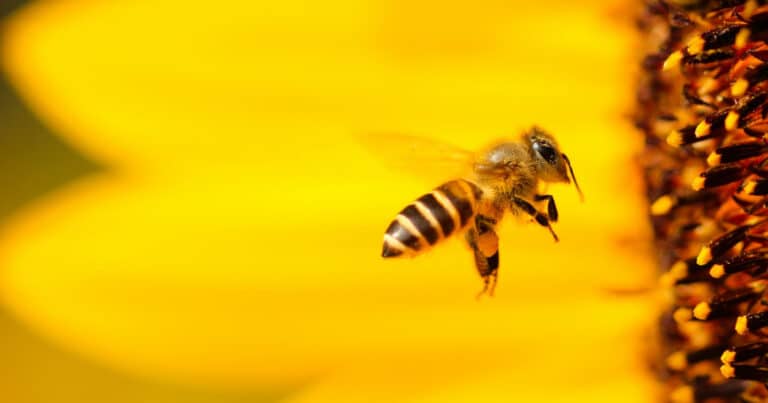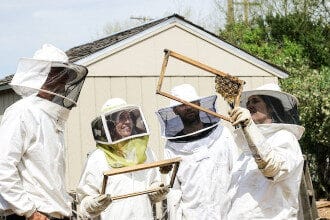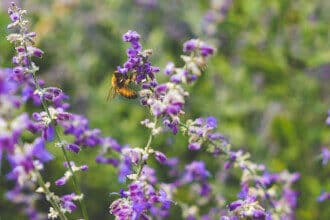By Ethel Mendius – Why are bees important? Bees pollinate food crops and fulfill other crucial ecosystem services for humans, plants, and animals. However, the population of bees and other insects is at risk, and we must take measures to protect them.
What Do Bees Do?
Bees are a leading pollinator. Pollination is essential because the vast majority of flowering plants “require pollinators to aid in reproduction.”
Pollination occurs when an insect travels between flowers looking for pollen or nectar to eat. It picks up pollen from the male part of one flower and plants it on the female part of another, fertilizing it.
Pollination services are essential because “the fertilized flower later yields fruit and seeds.” We have bees and other pollinators to thank for countless fruits, such as apples, avocados and even coffee beans.
Other insects, and even birds and mammals, can pollinate food crops. However, bees are particularly industrious because they “gather pollen to stock their nests” rather than just feeding themselves, visiting more flowers in the process.
Types Of Bees
There are more than 20,000 known species and trillions of bees in the world. Some are farmed and some live in the wild.
Honey Bees
Honey bees, for the most part, “are kept by beekeepers in colonies of managed hives.” Hives are an artificial structure made to hold nests in which bees produce honey and beeswax.
Honey bees are also “the species most commonly used as commercial pollinators in the US.” In doing so, they “contribute $15 billion to the US economy every year” and account for “nearly a third of crop pollination.”
Wild Bees
Wild bees are bees that have not been domesticated. The most well known wild bee is the bumble bee, which can be found in social colonies, “usually in holes in the ground or tree cavities.”
Like honey bees, bumble bees can be used in the commercial pollination of many crops. Sometimes this includes “wildlife friendly farming techniques, such as allowing areas of meadow [and] maintaining pollinator margins.”
Solitary bees are wild bees that “tend to nest on their own”. Solitary bees in the Megachilidae family, such as mason bees and leafcutter bees, are “extremely efficient pollinators,” particularly for orchard crops.
Why Is Bee Pollination Important?
“Approximately 80% of all flowering plants are specialized for pollination by animals,” which means that bees and other pollinators are crucial to our food system. Pollination is necessary for both food and livestock crops such as alfalfa.
Without bees, farmers would have to manually pollinate their crops at great expense: “estimates suggest it would cost UK farmers an incredible £1.8 billion a year” to do so.
Furthermore, “there is evidence that natural pollination by the right type of bee improves the quality of the crop.” Without bees, pollinator dependent crops would be at risk, and so would our global food supply.
Bees And Biodiversity
Bee pollination supports many forms of life and contributes to the Earth’s biodiversity. For instance, “birds and mammals may rely on berries, seeds and also some fruits and nuts” provided by pollinating insects.
Pollination maintains native plant species, including many trees, wildflowers, and shrubs. Trees, in turn, “support much wildlife, help to stabilize soil structure and landscapes, and are the lungs of the earth.”
In addition to being food and shelter for other animals, these plants themselves contribute to the Earth’s beauty and biodiversity, as do bees. There are over 20,000 bee species, which must be protected to maintain our wide array of natural ecosystems.
Bees and Human Health
Bees are best known for their honey, but as the FDA reports, “these social and hardworking insects produce six hive products – honey, pollen, royal jelly, beeswax, propolis, and venom.” All of these hive products serve medicinal purposes.
Honey is used in traditional medicine and as a home remedy. Both honey and pollen contain antioxidants, “which can protect the body from inflammation.“
Beeswax is relied on by the cosmetic and pharmaceutical industries alike. In many medicines, it acts as “a binding agent, time-release mechanism, and drug carrier.”
Royal jelly, “a creamy white substance with a high nutrient content that young bees make to feed queen bee larvae,” can be taken as a supplement. It is noted for its antibacterial properties.
Further medical uses for bee products have yet to be revealed. A 2020 study “found evidence that melittin, a component in honeybee venom, could kill cancer cells.”
Bee products play a substantial role in both western and traditional medicine. Considering too the nutritional value of the many crops they pollinate, it is clear that bees are essential to human health.
The Beekeeping Industry
Bees have been domesticated, and their byproducts harvested, for thousands of years. Today, “the beekeeping industry provides an income for beekeepers and their families… as well as an income for suppliers of beekeeping equipment,” playing a crucial role in the global economy.
This is especially true in developing countries. Throughout the Global South, “bees help people and communities” who rely more heavily on traditional medicine and subsistence farming.
For many, beekeeping provides a path out of poverty: “charities such as Bees For Development help communities to earn a sustainable living and pollinate food crops through beekeeping.”
Harm To Bees
Unfortunately, bees and other pollinators are in crisis. Reports show that “as many as 40% of the world’s insect species are in decline,” with many of the top causes linked to human activity.
Agricultural practice plays a significant role. The widespread use of pesticides has been “a key cause of pollinator decline,” along with herbicides, which “target a huge variety of the wild plants that bees need to forage.”
Climate change and habitat destruction have also led to fewer bees. The consequences will be vast if we do not address the threats faced by this important species.
Bees And Religion
Leviticus 11:23 – But all other winged swarming things that have four legs shall be an abomination for you.
No Bees, No Honey (Or Many Other Foods) From Eco Bible Volume 2
Despite the biblical prohibition against eating most insects, they have long been a significant source of food in most parts of the world, including Central and South America, Africa, Asia, and Australia. The UN Food and Agriculture Organization suggests insects as a potential protein resource for feeding the world’s population as other resources, such as fish, decline. Meanwhile, many insect species are also in dangerous decline or threatened due to habitat loss, pesticide use, disease, and climate change. The biblical prohibition against eating most insects likely had the effect of protecting insects in ancient Israel.
Bees are a striking example of insects critical to human life put at risk by human activity. Bees pollinate 70 of the 100 species of crops that provide 90 percent of food worldwide, but bee populations are being devastated. Nine percent of European wild bee species could become extinct, and 5 percent could be threatened in the near future. Some governments are moving slowly to try to save bee populations by legislating against pesticides that end up harming beneficial insects. Urban beekeepers in a number of major cities are working to convert empty lots into locations for beehives. The Honey Bee Conservancy, which works in cities like New York City, Seattle, and Miami, estimates that it has helped raise 10 million bees in 44 states.
In Israel, the bee population is holding steady, thanks to 80,000 to 100,000 seedlings – especially eucalyptus trees – planted every year to provide bees with a varied, abundant diet across the seasons. The Jewish National Fund (KKL-JNF) nurseries provide these seedlings free, and they are planted on beekeepers’ land. “As open areas are decreasing in the last decade, we find ourselves with less land for afforestation. But with this strategy of planting saplings on beekeepers’ lands everybody benefits: We have trees, the bees have flowers, and the keepers have honey,” explains Aviv Eizenband, head of forestry and professional development at KKL-JNF’s Forest Service.
Israel is known as the “land of milk and honey.” The Midrash says:
The purposes of the Blessed Holy One are carried out in all places, and God has not created a single thing in vain. Sometimes God’s purpose is achieved by means of a frog, sometimes by means of a hornet, sometimes by means of a scorpion. . . . This is indeed the way of the Blessed Holy One – to achieve a purpose by means of small things!
* Featured image source







